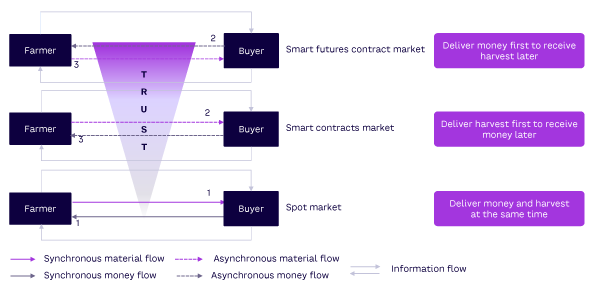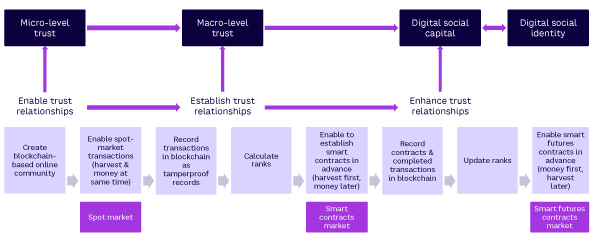The Digital Trust Transformative Market (DTTM) model offers a robust solution to the challenges faced by traditional agri-food supply chains. By leveraging blockchain technology to foster trust among supply chain actors, DTTM enables the creation of dynamic, efficient, sustainable supply chains.
A supply chain in which various actors are connected through an efficient market mechanism can rapidly adjust to varying conditions. Among other factors, the ability to establish trust among previously unknown parties is a key requirement for an efficient market. DTTM consists of three market mechanisms with various levels of trust for its operation: spot markets, smart contracts markets, and smart futures contracts markets (see Figure 1).

Actors can start trading with a market mechanism that requires a low level of trust and, over time, transit into mechanisms that require a higher level of trust. The market models that require a higher level of trust provide higher economic benefits, such as support for automatic aggregation, enabling economies of scale.26
The spot market, which requires the least amount of trust, helps farmers trade their harvest after negotiating a price with buyers. Transactions are recorded in the blockchain, ensuring non-repudiation, reliability, and immutability, thus enabling trust in the market model. This tamper-proof data is used to generate ranks for the farmers, buyers, and farmers’ communities, generating trust indicators for them.
Over time, DDTM enables the smart contracts market, where farmers can sell their expected harvest in advance to buyers who offer competitive rates. These transactions are recorded in the blockchain to update the ranks, improving the trust relationships between them. The improved trust relationships enable engagement in the community, influencing stronger social networks, increased cooperation, and enhanced collective well-being, generating social capital.
This social capital enables the smart futures contract market, where the farmers can sell their expected harvest in advance and request an up-front payment using social capital as collateral. The farmers can use this payment to apply high-quality inputs and modern technology to produce high-quality harvests that attract higher prices. The process of trust and social capital development in the DTTM model is shown in Figure 2.

With enhanced trust levels, DTTM enables dynamic behavior in the market, since the buyers and sellers do not need preestablished trust to perform transactions. They can sense and respond according to the market requirements, since the risk of not getting paid or not receiving the products is minimized. This helps them allocate resources optimally, reducing waste and improving efficiency.
Additionally, DTTM optimizes transportation by enabling better coordination and planning. With real-time market intelligence and demand information, logistics can be optimized to minimize empty trips, reducing fuel consumption and lowering transportation-related GHG emissions.
[For more from the authors on this topic, see: “Blockchain for Sustainable Agri-Food Ecosystems.”]




